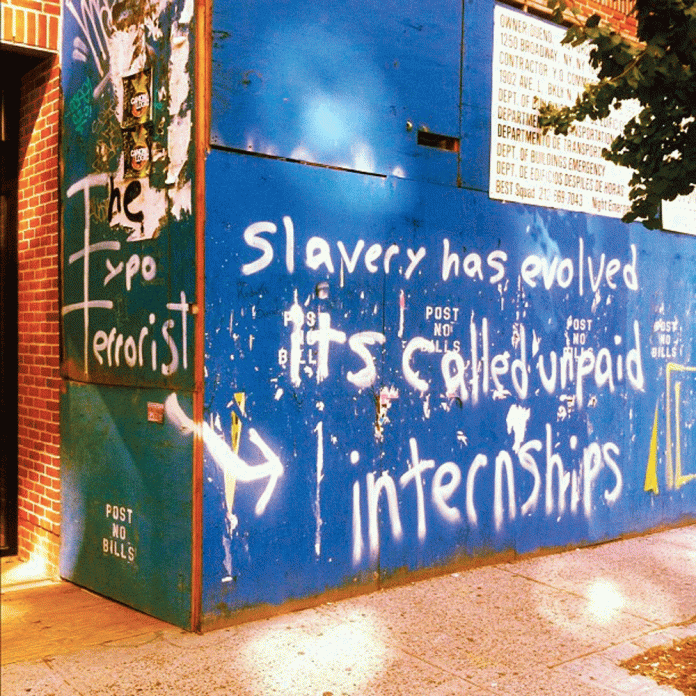Jack Shea
Staff Writer
Internships have the power to turn a student’s career into a dream job or, at the very least, provide informative venues for exploring professional interests. Reasoning for pursuing internships varies across the spectrum. Rising tuition fees, a likely oncoming economic crash, dreams of being the next top CEO-president of the United States, or dreams of making sure that an unqualified CEO never touches the White House again could be the rationales for wanting to pursue internships in 2017.
John Greathouse, a professor of the University of California, Santa Barbara’s Technology Management Program, encourages students to find “relevant internships and mentors” because they are the main determinants of economic success for college graduates. Internships can sometimes be the force connecting students to finding mentors, but what happens when the student has limited options? What are students to do when their only options are unpaid positions?
Andrew Mark Bennett, a juris doctor candidate at the University of Maryland School of Law, writes in the University of Maryland Law Journal of Race, Religion, Gender and Class and focuses his research on unpaid internships. He argues, “there is considerable support for the argument that unpaid interns are employees under the [Fair Labor Standards Act].”
Although reaffirming, this can be confusing for students because paid internships, especially in non-STEM fields, are few and far in between. Bennett clarifies, “Congress granted the Department broad powers to enforce and interpret the FLSA,” allowing for the Department of Labor to rarely enforce the FLSA. This makes the Department of Labor’s job easier and gives employers more autonomy in the private and public sectors.
The autonomy of the employers permits for their own creation of values regarding education. Employers, to justify different types of exploitation, use education as a tool.
Samantha Chang, a fourth year sociology major, sees this abuse.
“[Unpaid internships] are necessary evils in that we need them for our resume, and we aren’t in a major that people weigh them heavily,” said Chang. “Humanities in general are very risky in terms of employment. Society favors different majors more, and STEM majors are higher acclaimed.”
Even former president Barack Obama promoted STEM education over Humanities. In 2013, Obama proposed a new undergraduate ranking system off of “schools that provide the best value,” or institutions whose graduates make the most money. Careers stemming from humanities majors, such as writers, teachers, and the like, cannot compare incomes to typical STEM major graduates, such as careers in engineering fields and technological development. Using income to rate undergraduate institutions would completely disregard social studies.
Not only are humanities majors struggling to find paid internships, but their resources are limited. UCSB’s first job fair every year titles “Fall Career & Internship Fair.” However, the fair may as well rename to “First STEM Internship Fair of Fall,” as its website states, “the two areas are ‘STEM’ and ‘All Majors’.” In other words, STEM majors have a possible job opportunity at every table but “All” other majors are limited.
Ironically, employers fail to educate potential employees with weak internship descriptions. Jessica Curiale studies how employers use weak descriptions and lacking employee training procedures to exploit interns in the Hastings Law Journal.
“Even interns who are able and willing to work for experience without actual wages may find themselves facing unanticipated problems,” Curiale wrote. “Because interns are often young, and their positions within companies can be vague, interns may have a particularly difficult time asserting themselves.” Using “vague” descriptions allows for interns to be exploited emotionally and financially, such as being subjected to harassment of all kinds on the job.
Employers provide more reason for students to constantly be networking and educating themselves on company cultures and values. The best way to know if an employer is a right fit is by talking to people who previously worked for the potential intern’s desired employer. Social media sites such as LinkedIn and Facebook provide excellent platforms on which to network.
Additionally, UCSB graduates (especially recent graduates) are often more than willing to partake in informational interviews, according to professors and Career Services employees. When in contact with a previous intern and/or UCSB student, a UCSB student can find out secondhand the employer’s culture, figure out what an average day in that internship consists of, and dare to ask whether the position was worth the free labor. Investigate, friends.
From a student perspective, it can be unethical to take an unpaid internship because of what it implies about the student’s work. Taking an unpaid internship assumes there is no value to a new employee’s work. A lack of governmental enforcement on employers allows for economic disparities to persist. Students from lesser privileged backgrounds cannot afford the objectification of their free labor, allowing for wealthier, more privileged students to take the unpaid internships.
The argument for using free intern labor is in the education, but internships often do not live up to educational standards, at least a University of California educational standard. This means gaining “valuable experience,” as UCSB’s Career Services’ website says. Valuable experience, to some employers, could mean stapling, running coffee errands, working 12 hours without overtime pay or any compensation, and more meaningless tasks that are considered legal in the U.S., as long as the internship can pass as “volunteering,” according to Bennett’s findings. Bennett’s research suggests that students must consider their values when applying for internships and consider sparking change themselves.
Notify local news organizations and activist groups of the exploitation. Knowing the terms by which the employer uses to justify the exploitation is crucial, as well as developing a strong argument for the fallacy. Writing about the exploitation, talking about the exploitation, and any other form of persistent communication to student and non-student communities will create an incentive to dismantle the weak argument that student labor is free labor.
UPDATE
Mar. 9, 5:05 p.m.: A previous version of this article incorrectly linked Bennett’s article. It has been properly linked.











